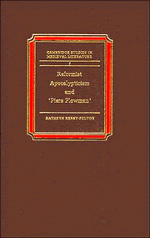Book contents
- Frontmatter
- Contents
- Acknowledgments
- List of abbreviations
- 1 Introduction
- 2 The visionary prophecy of Hildegard of Bingen in relation to Piers Plowman
- 3 Piers Plowman and the medieval visionary tradition
- 4 Leaven of malice: false apostles in the anti-mendicant apocalypticism of later medieval England
- 5 Leaven of hope: new leadership and Joachite apocalypticism
- 6 Conclusions
- Notes
- Select bibliography
- General index
- Index of biblical citations
- Index of manuscripts
4 - Leaven of malice: false apostles in the anti-mendicant apocalypticism of later medieval England
Published online by Cambridge University Press: 15 October 2009
- Frontmatter
- Contents
- Acknowledgments
- List of abbreviations
- 1 Introduction
- 2 The visionary prophecy of Hildegard of Bingen in relation to Piers Plowman
- 3 Piers Plowman and the medieval visionary tradition
- 4 Leaven of malice: false apostles in the anti-mendicant apocalypticism of later medieval England
- 5 Leaven of hope: new leadership and Joachite apocalypticism
- 6 Conclusions
- Notes
- Select bibliography
- General index
- Index of biblical citations
- Index of manuscripts
Summary
INTRODUCTION: “ORDO” PROPHECY IN MEDIEVAL APOCALYPTIC THOUGHT
For there shall arise false Christs and false prophets and shall shew great signs and wonders, insomuch as to deceive (if possible) even the elect.
(Matthew 24:24)Apocalyptic thought is concerned mainly to distinguish the false from the true. At one point Hermas asks the Shepherd to teach him to distinguish between true and false prophets; Langland's Will pleads with Holy Church, “Mercy, madame, for Mary loue of heuene …/ Kenne me by sum craft to knowe be false” (11. 2–4). The apocalyptic mentality, urged on by multiple New Testament warnings like the one quoted from Matthew above, is ever on the alert for signs of both spiritual fraud and messianic leadership. Medieval apocalypticism, therefore, can be read as a history of groups which were considered to be either the new apostles or the muchfeared pseudo-apostles of any given author's time. In the later Middle Ages many new groups or clerical orders were heralded as true apostles and seen as a longawaited leaven of hope for the future. Equally, apocalyptic thinkers warned of other orders or groups whom they believed to be the pseudo-apostles, forerunners of Antichrist and false brethren. Often, one man's hope for the future was another man's despair. This mentality was fed by the rise of new religious orders and by the controversies and rivalries which they sparked as groups both old and new tried to justify their particular choice of path to Christian perfection. In the twelfth century, apocalyptic thinkers who were members of newly founded religious orders often incorporated their own order into a future plan for renewal, resulting in some of the first traces of apocalyptic optimism in medieval thought.
- Type
- Chapter
- Information
- Reformist Apocalypticism and Piers Plowman , pp. 133 - 161Publisher: Cambridge University PressPrint publication year: 1990



